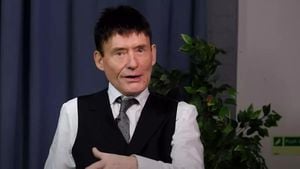The British Council's New Directions South Asia 2025 conference commenced on February 21, 2025, in New Delhi, India, highlighting the pressing need for effective English language assessment across the region. This landmark event, which brought together UK and global experts for the first time, aims to tackle significant challenges within English language learning and assessment, especially as English continues to play a pivotal role worldwide.
According to the conference officials, including Professor Barry O’Sullivan OBE, the Director of English Language Research at the British Council, the theme was aptly titled "Technology and Tradition: The Changing Face of Assessment in English Language Learning Systems." This sets the stage for discussions on how modern methodologies can align with traditional values to create effective assessment frameworks.
With approximately 129 million English speakers representing roughly 10.6% of the Indian population, English proficiency is increasingly linked to access to global education and job opportunities. Despite ranking 69th on English proficiency metrics for 2024, India's aspirations to build a global knowledge economy underpin the event's significance. Duncan Wilson, Managing Director of BC Education India, remarked, "It is inspiring to see this landmark conference come to life, bringing together such diverse expertise from across South Asia and beyond to address the rapidly changing English language assessment needs."
Emphasizing the importance of technological innovations, O'Sullivan stated, "India’s ambition to become a global knowledge economy relies heavily on its ability to work with diverse languages and cultural contexts." The conference also created opportunities for regional thought leaders and educators to collaborate, featuring insightful panel discussions on topics such as adapting English assessments to South Asia's linguistic diversity.
Complementing the conference narrative is the ambitious film project "Toxic – A Fairy Tale for Grown-Ups," led by the acclaimed director Geetu Mohandas and starring Indian film icon Yash. This film is noteworthy not only for its artistic vision but also for its dual-language approach, being shot simultaneously in English and Kannada. Mohandas articulated the film’s vision: "Our goal is to create compelling narratives transcending borders, languages, and cultural confines to resonate globally.”
Filming of "Toxic" began in August 2024 and is backed by production companies including KVN Productions and Yash’s Monster Mind Creations. This film is expected to be one of the industry's most expensive productions due to the intricacies involved with dual-language filming, as it requires extended shooting schedules and substantial investment. The producer, Venkat K. Narayana, stated, "Our goal was clear: to create a film with global resonance," highlighting the project’s ambition to capture the attention of both Indian and international audiences.
Parallel to these developments, the realities of English language testing present substantial challenges for test-takers. A recent survey conducted by Pearson reveals stark insights about test-taker perceptions of bias. Over 62% of Indian English test-takers believe their accents might negatively impact speaking test scores, reflecting deep-seated concerns about how appearance and accent bias can shape outcomes. Prabhul Ravindran, director of English Language Learning at Pearson India, noted, "For many years, people's insecurities with their accents and appearances have determined the opportunities available to them, impacting their earning potential."
The survey, which involved 1,000 respondents, found troubling insights: nearly 74% of respondents felt their physical appearance would impact scores assessed by human examiners. Beyond accents, participants expressed worries about implicit biases relating to skin color and how dress influences perceptions during assessments, especially prevalent among respondents from states like Maharashtra.
Ravindran emphasized the need for reforms, mentioning the introduction of responsible AI technology aimed at minimizing biases within English proficiency assessments. "By designing a test focused solely on assessing language proficiency, free from face-to-face interviews, we aim to create opportunities for everyone to chase their dreams," he said.
The two-day conference is set to address various themes, such as enhancing employability through English language skills, the role of Artificial Intelligence (AI) in English education, and assessing young learners—each emphasizing the need for culturally responsive assessment practices.
Overall, both the British Council's conference and the film "Toxic" signal significant strides toward refining English language learning and bridging global gaps through bilingual storytelling. The dialogue surrounding innovative assessment practices continues to evolve, as stakeholders strive to create inclusive educational environments reinforcing the foundational role of English globally.
The interactions at events like New Directions South Asia 2025 and initiatives like "Toxic" showcase the transformation underway as South Asia navigates the intersections of language, culture, and technology—fostering broader opportunities for learners and filmmakers alike, who aim to thrive on the international stage.



